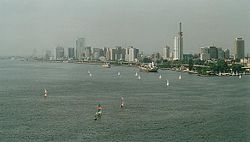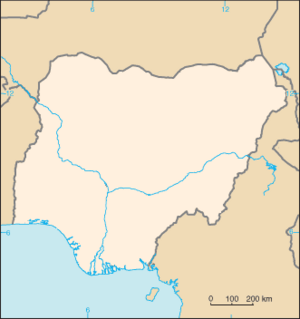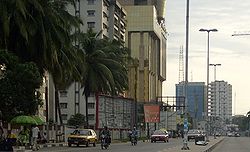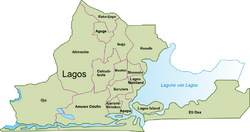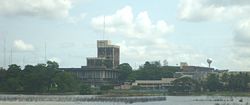Lagos
| Lagos Eko |
|||
| Lagos Island as seen from the harbour near Victoria Island. | |||
|
|||
| City of Lagos showing main urban areas | |||
| City of Lagos showing main urban areas | |||
| Coordinates: {{#invoke:Coordinates|coord}}{{#coordinates:6|27|11|N|3|23|45|E|type:city | |||
|---|---|---|---|
| name= }} | |||
| Country | |||
| State | Lagos State | ||
| LGA | Lagos Island | ||
| Area [1] | |||
| - Urban | 999.6 km² (385.9 sq mi) | ||
| Population (2006 census, preliminary)[2] | |||
| - City | 13,000.000 | ||
| - Density | 7,941/km² (20,569.9/sq mi) | ||
| - Urban | 7,937,932 | ||
| Time zone | CET (UTC+1) | ||
| Website: http://www.lagosstate.gov.ng/ | |||
Lagos (pron. IPA: /ˈleɪgɒs/ or /ˈlɑːgoʊs/ overseas) is the most populous conurbation in Nigeria with 7,937,932 inhabitants at the 2006 census.[2] In 2006, it was the second most populous city in Africa, and was estimated to be the second fastest growing city in Africa (seventh fastest in the world),[3] immediately following Bamako. Formerly the capital of Nigeria, Lagos has spread on the mainland west of the lagoon and the conurbation, including Ikeja and Agege, now reaches more than 40km north-west of Lagos Island. The city is the economic and financial capital of Nigeria.
Geography
Lagos is Portuguese for "lakes". Lagos was a Yoruba settlement of Awori people initially called Oko. The name was later changed to Eko (Edo: "cassava farm") or Eko ("war camp") during the Kingdom of Benin occupation. The Yoruba still use the name Eko when they speak of 'Lagos', a name which never existed in Yoruba language. It is likely that the name 'Lagos' was given to the town by the first Portuguese settlers who navigated from a coastal town of the same name in Portugal.
The city of Lagos lies in south-western Nigeria, on the Atlantic coast in the Gulf of Guinea, west of the Niger River delta. On this stretch of the high-rainfall West African coast, rivers flowing to the sea form swampy lagoons, like Lagos Lagoon, behind long coastal sand spits or sand bars. Some rivers, like Badagry Creek, flow parallel to the coast for some distance before finding an exit through the sand bars to the sea.
The two major urban islands of Lagos in Lagos Lagoon are Lagos Island and Victoria Island. These islands are separated from the mainland by the main channel draining the lagoon into the Atlantic, which forms Lagos Harbour. The islands are separated from each other by creeks of varying sizes and are connected to Lagos Island by bridges. However the smaller sections of some creeks have been sand filled and built over.
Lagos has a total of 1380.7 square miles (3577 square kilometers), of which 303.8 square miles (787 square kilometers) is made up of lagoons and creeks
Lagos has two rainy seasons, with the heaviest rains falling from April to July and a weaker rainy season in October and November. There is a brief relatively dry spell in August and September and a longer dry season from December to March. The hottest month is March; with a mean temperature of 84°F (29°C), while July is the coolest month, when it is 77°F (25°C). The main dry season is accompanied by harmattan winds from the Sahara Desert, which between December and early February can be quite strong. Monthly rainfall between May and July averages over 12 inches (300mm), while in January as low as 1.5 inches (35mm). Annual precipitation totals 59.33 inches (1507mm).
Lagos Island contains many of the largest markets in Lagos, its central business district, the central mosque, and the Oba's palace. Though largely derelict, Tinubu Square on Lagos Island is a site of historical importance; it was here that the Amalgamation ceremony that unified the north and south took place in 1914.
Ikoyi situated on the eastern half of Lagos Island, housed the headquarters of the federal government and all other government buildings. It also has many hotels, and one of Africa's largest golf courses. Originally a middle class neighbourhood, in recent years, it has become a fashionable enclave for the upper middle class to the upper class.
Victoria Island is situated to the south of Lagos Island. It is one of the suburbs of Lagos which boasts of several sizable commercial and shopping districts (including Nigeria's largest mall and movie theater) and several trendy beaches.
Across the main channel of the lagoon from Lagos Island, a smaller island called Iddo Island is situated close to the mainland, and now is connected to the mainland like a peninsula. Three major bridges join Lagos Island to the mainland: Eko Bridge and Carter Bridge which start from Iddo Island, and the Third Mainland Bridge which passes through densely populated mainland suburbs through the lagoon.
Most of the population live on the mainland, and most of the industries are located on the mainland. Lagos known for its music and night life which used to be located in areas around Yaba and Surulere but in recent years more night clubs have sprung on the island making the island especially Victoria Island, the main nightlife attraction, Mainland districts include Ebute-Meta, Surulere, Yaba (Lagos) (site of the University of Lagos), Mushin, Maryland, Isolo, Ikotun, Ipaja, Ejigbo and Ikeja, site of Murtala Muhammed International Airport and the capital of Lagos State.
History
Southwestern Nigeria was inhabited as early as 9000 B.C.E., according to archaeological evidence. The earliest identified Nigerian culture is that of the Nok people who thrived between 500 B.C.E. and 200 C.E. on the Jos Plateau in northeastern Nigeria. Information is lacking from the first millennium C.E. following the Nok ascendancy, but by the 2nd millennium C.E., there was active trade from North Africa through the Sahara to the forest.
The present day Lagos state has a higher percent of Awori, who migrated to the area from Isheri along the Ogun river. Throughout history, it was home to a number of warring ethnic groups who had settled in the area. During its early settlement, it also saw periods of rule by the Kingdom of Benin.[4]
Portuguese explorer Rui de Sequeira visited the area in 1472, naming the area around the city Lago de Curamo; indeed the present name is Portuguese for "lakes". Another explanation is that Lagos was named for Lagos, Portugal - a maritime town which at the time was the main centre of the Portuguese expeditions down the African coast and whose own name is derived from the Latin word Lacobriga.
From 1404-1889 it served as a major centre of the slave trade, ruled over by Yoruba kings called the Oba of Lagos. In 1841 Oba Akitoye ascended to the throne of Lagos and tried to ban slave trading. Lagos merchants, most notably Madam Tinubu, resisted the ban, deposed the king and installed his brother Oba Kosoko.
While exiled, Oba Akitoye met with the British, who had banned slave trading in 1807, and got their support to regain his throne. In 1851 he was reinstalled as the Oba of Lagos
Lagos was formally annexed as a British colony in 1861. This had the dual effect of crushing the slave trade and establishing British control over palm and other trades.[5]
The remainder of modern-day Nigeria was seized in 1887, and when the Colony and Protectorate of Nigeria was established in 1914, Lagos was declared its capital. It continued to be the capital when Nigeria gained its independence from Britain in 1960.
Lagos experienced rapid growth throughout the 1960s and 1970s as a result of Nigeria's economic boom prior to the Biafran War.
Lagos was the capital of Nigeria from 1914 up to 1991; it was stripped of this title when the Federal Capital Territory was established at the purpose-built city of Abuja. However, most government functions (especially the head of state) stayed in Lagos for a time since Abuja was still under construction. In 1991, the head of state and other government functions were finally relocated to the the Capital city Abuja
In 2002, an accidental detonation of military explosives killed more than 1100 people.
Government
Nigeria is a federal republic. The president, who is is both the chief of state and head of government, is elected by popular vote for a four-year term and is eligible for a second term. The bicameral National Assembly consists of the Senate, of 109 members elected by popular vote to serve four-year terms, and the House of Representatives, of 360 members elected by popular vote to serve four-year terms.
Since Lagos is not a municipality it has no overall city administration. The Municipality of Lagos, which covered Lagos Island, Ikoyi and Victoria Island as well as some mainland territory, was disbanded in 1976 and divided into several local government areas (most notably the Lagos Island, Lagos Mainland, and Eti-Osa).
Today, the word Lagos most often refers to the urban area, called "Metropolitan Lagos" in Nigeria, which includes both the islands of the former Municipality of Lagos and the mainland suburbs. All of these are part of Lagos State, which now comprises 20 local government areas, and which is responsible for roads and transportation, power, water, health, and education.
Metropolitan Lagos (a statistical division, and not an administrative unit) extends over 16 of the 20 local government areas of Lagos State, and contains 88 percent of the population of Lagos State, and includes semi-rural areas.
Lagos was the former capital city of Nigeria but was replaced by Abuja in December 1991. Lagos is also home to the High Court of the Lagos State Judiciary, housed in an old colonial building on Lagos Island.[6]
Economy
Oil-rich Nigeria has long been hobbled by political instability, corruption, inadequate infrastructure, and poor macroeconomic management. [7] In 2000, Nigeria entered into a debt-restructuring deal with the Paris Club and a $1-billion credit from the International Monetary Fund, both contingent on economic reforms, but pulled out of the IMF program in 2002, after failing to meet spending and exchange rate targets, making it ineligible for additional debt forgiveness from the Paris Club. Since 2008, the government has begun to implement reforms urged by the IMF, such as to modernize the banking system, to curb inflation by blocking excessive wage demands, and to resolve regional disputes over the distribution of earnings from the oil industry. Nigeria's per capita GDP was estimated at $2200 in 2008.
Lagos is Nigeria's most prosperous city, and much of the nation's wealth and economic activity are concentrated there. Lagos has one of the highest standard of living as compared to other cities in Nigeria.
The commercial, financial and business center of Lagos and of Nigeria remains the business district of Lagos Island, where most of the country's largest banks and financial institutions are located.
More than half of Nigeria's industrial capacity is located in Lagos's mainland suburbs, particularly in the Ikeja industrial estate. A wide range of manufactured goods are produced in the city, including machinery, motor vehicles, electronic equipment, chemicals, beer, processed food, and textiles.
Lagos is the hub of three Trans-African Highway routes: The Trans-West African Coastal Highway to Benin, Dakar and Nouakchott; the Trans-Sahara Highway to Algiers; and the Lagos-Mombasa Highway, which in 2009 only went to neighbouring Cameroon.
The Lagos–Ibadan expressway and the Lagos–Abeokuta expressway are the major arterial routes in the north of the city and serve as inter-state highways to Oyo State and Ogun State respectively. To the west the congested Badagry Expressway serves outlying suburbs such as Festac Town as well as being an international highway.
The city is teeming with transit buses known to locals as Danfos and Molues, as well as taxi motorcycles known as Okadas.
Lagos State implemented a bus rapid transit system, the first phase of which was completed in February, 2008. It is expected to operate along eight routes using specially designated lanes
Lagos is served by Murtala Mohammed International Airport, which is located in the northern suburb of Ikeja and has domestic and international terminals.
A few regular ferry routes run between Lagos Island and the mainland. Private boats run irregular passenger services on the lagoon and on some creeks.
The Port of Lagos is Nigeria's leading port and one of the largest in Africa. It is split into three main sections: Lagos port, in the main channel next to Lagos Island, no longer used much, Apapa Port (site of the container terminal) and Tin Can Port, both located in Badagry Creek which flows into the Lagos Harbour from the west.[8] The port features a railhead.
Demographics
There were 7,937,932 inhabitants in Metropolitan Lagos in 2006, according to the 2006 census, .[2], making it the 14th most populous city in the world.[9] This figure was lower than anticipated and created a controversy in Nigeria. Lagos Island, the central local government area and historic centre of Metropolitan Lagos, had a population of 209,437 in the 2006 Census.[10]
After the 1970s Nigerian oil boom, Lagos underwent a population explosion, untamed economic growth, and unmitigated rural migration. This caused the outlying towns and settlements to develop rapidly, thus forming the greater Lagos metropolis seen today. Lagos remains one of the fastest-growing cities in the world. Lagos State is currently experiencing a population increase of about 275,000 persons per annum.
There is a huge spectrum of wealth distribution among the people who live in Lagos, ranging from the very wealthy to the very poor. Lagos has attracted many young entrepreneurs and families seeking a better life.
Nigeria, Africa's most populous country, is composed of more than 250 ethnic groups. The Hausa and Fulani make up 29 percent of the population, Yoruba 21 percent, Igbo (Ibo) 18 percent, Ijaw 10 percent, Kanuri 4 percent, Ibibio 3.5 percent, and Tiv 2.5 percent.
English is the official language, although Hausa, Yoruba, Igbo (Ibo), and Fulan are also spoken. About 50 percent of the population is Muslim, 40 percent Christian, and 10 percent follow indigenous beliefs.
Lagos City University (formerly Yaba College of Technology) was the first tertiary education institute in the country, and one of the first in Africa. The Pan-African University, founded in 1996, is primarily a business school, offering two MBA programmes. The University of Lagos founded 1962 has over 35,000 students. Lagos State University is a multi-campus university established in 1984. National Open University is the first open university in Nigeria, Lagos State College of Health Technology runs health courses, and Lagos State Polytechnic comprises five schools.
Culture
Music & film industry
Lagos is famous throughout West Africa for its music scene. Lagos has given birth to a variety of styles such as highlife, juju, fuji, and Afrobeat. In recent years Lagos has been the fore-runner with African styled hip-hop branded Afrohip-hop.
Lagos is the center of the Nigerian film industry, often referred to as 'Nollywood.' Idumota market on Lagos Island is the primary distribution center. Also many films are shot in the Festac area of Lagos.
The cinemas are gradually losing their supporters to the movie industry. Yoruba films happen to be the most watched in the cinemas, followed by Indian films. Films are not premiered for a long period of time in the western sense, especially with Yoruba films. The English spoken films move directly from the studios to the market.
Iganmu is home to the National Arts Theater — the primary centre for the performing arts in Nigeria.
Football
As in the rest of Nigeria, football is the most popular sport. The Nigeria Football Association (NFA) and the Lagos State Football Association (LAFA) are both based in Lagos. A prominent Lagos soccer club Julius Berger FC (a member of the Nigerian Premier League) is set to close in 2008, potentially leaving Lagos without a Premier League team.[11]
The Nigerian national football team, also known as the Super Eagles, used to play almost all of their home games in Lagos; however, games are now split between the Surelere Stadium in Lagos and the larger, newer Abuja Stadium in Abuja, which may soon become the default home of the Super Eagles.[12][13]
Tourism
Lagos is not a popular tourist destination, as it is primarily business-oriented and also has a reputation for being a fast paced community. Lagos is blessed with a number of sandy beaches by the Atlantic ocean. Two of the popular beaches includes Bar Beach and Lekki Beach.
Lagos has a variety of hotels ranging from three star to five star hotels. Some of the popular hotels include Sheraton Hotel and Towers, Federal Palace Hotel, Ikoyi Hotel, Sofitel Lagos Moorhouse Ikoyi, Eko Hotels And Suites and The Palmview Manor.
Visitors are mostly attracted to Nigeria's rich culture, entertainment scenes and vitality which Lagos city offers. Tourist attractions include Oba's Palace, the National Museum, Shrine of Fela and the beach resorts.
New Districts
Eko Atlantic City
Eko Atlantic city is a planned district to be constructed, intended to be built on land reclaimed from the Atlantic Ocean. The proposed development is targeting 250,000 residents and 200,000 commuters flowing daily to the island. The project is planned to return the coast to its position in the 1950s and 1960s, reversing damage done by erosion.[14]
Personalities
- Main article : People from Lagos
- Bisi Silva
- Ndidi Dike
- Tony Allen
- Keziah Jones
- Bola Abimbola
- Olatunji Jabitta
Footnotes
- ↑ Summing the 16 LGAs making up Metropolitan Lagos (Agege, Ajeromi-Ifelodun, Alimosho, Amuwo-Odofin, Apapa, Eti-Osa, Ifako-Ijaiye, Ikeja, Kosofe, Lagos Island, Lagos Mainland, Mushin, Ojo, Oshodi-Isolo, Shomolu, Surulere) as per:
The Nigeria Congress. Administrative Levels - Lagos State. Retrieved 2007-06-29. - ↑ 2.0 2.1 2.2 Summing the 16 LGAs making up Metropolitan Lagos (Agege, Ajeromi-Ifelodun, Alimosho, Amuwo-Odofin, Apapa, Eti-Osa, Ifako-Ijaiye, Ikeja, Kosofe, Lagos Island, Lagos Mainland, Mushin, Ojo, Oshodi-Isolo, Shomolu, Surulere) as per:
Federal Republic of Nigeria Official Gazette (15 May 2007). Legal Notice on Publication of the Details of the Breakdown of the National and State Provisional Totals 2006 Census (PDF). Retrieved 2007-06-29. - ↑ World's fastest growing cities and urban areas from 2006 to 2020, by CityMayors.com
- ↑ Edo Nation - The Origin of Eko (Lagos)
- ↑ [http://apps.atlantaga.gov/sister/lagos/nigeria/lagos.html "A Brief History of Lagos State." Website of City of Atlanta, Georgia - Sister City, checked 24/7/07.
- ↑ Lagos Judiciary
- ↑ World Fact Book 2009 Nigeria Retrieved January 24, 2009.
- ↑ OT Africa Line - Nigeria Page
- ↑ Wikipedia List of Cities By Population Retrieved January 24, 2009.
- ↑ Federal Republic of Nigeria Official Gazette (15 May 2007). Legal Notice on Publication of the Details of the Breakdown of the National and State Provisional Totals 2006 Census (PDF). Retrieved 2007-06-29.
- ↑ Nigeria Sports
- ↑ World Stadiums - Nigeria
- ↑ RSSSF - Nigeria Results
- ↑ Elumoye, Deji, "'Eko Atlantic City Underway'", Thisday (via allAfrica.com), AllAfrica Global Media, 2007-09-26. Retrieved 2008-02-04.
See also
- 2006 Abule Egba pipeline explosion
- 2006 Atlas Creek pipeline explosion
- Lagos Island
- Lagos State
- Large Cities Climate Leadership Group
- Treaty of Lagos
External links
- World Fact Book 2009 Nigeria Retrieved January 24, 2009.
- Encyclopaedia Britannica Lagos Retrieved January 24, 2009.
- Lagos State Government Official Site Retrieved January 24, 2009.
- Lagos State Judiciary Board
- Pictures of Lagos
- The Punch daily newspaper
- The Guardian daily newspaper
- This Day daily newspaper
- Vanguard daily newspaper
- MyNaijaNews Online News Service Based in Lagos
- Other
Coordinates: Template:Yoruba topics Template:All-Africa Games Host Cities
| ||||||||||
Credits
New World Encyclopedia writers and editors rewrote and completed the Wikipedia article in accordance with New World Encyclopedia standards. This article abides by terms of the Creative Commons CC-by-sa 3.0 License (CC-by-sa), which may be used and disseminated with proper attribution. Credit is due under the terms of this license that can reference both the New World Encyclopedia contributors and the selfless volunteer contributors of the Wikimedia Foundation. To cite this article click here for a list of acceptable citing formats.The history of earlier contributions by wikipedians is accessible to researchers here:
The history of this article since it was imported to New World Encyclopedia:
Note: Some restrictions may apply to use of individual images which are separately licensed.
